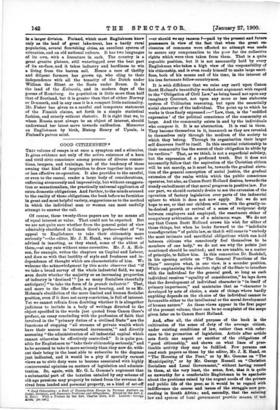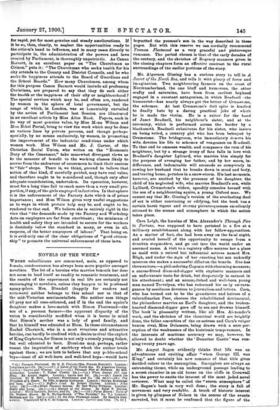GOOD CITIZENSHIP.* THis volume of essays is at once a
symptom and a stimulus. It gives evidence not only of the active existence of a keen and vivid civic conscience among persons of diverse connec- tions, tempers, and trainings, but of the tendency of those owning that kind of inspiration to draw together into more or less effective co-operation. It also provides to the careful, or even to the casual, reader a large body of considerations, enforcing strenuously and impressively, but without exaggera- tion or sensationalism, the practically universal application of extra-domestic obligations. And further, to the minds aroused to the reality of those obligations, the book before us furnishes in great and most helpful variety, suggestions as to the method in which the individual man or woman can most usefully attempt to answer the call.
Of course, these twenty-three papers are by no means all of equal interest or value. That could not be expected. But we are not quite sure whether from the general point of view admirably elucidated in Canon Gore's preface—that of "an appeal to Englishmen to take their citizenship more seriously "—the editor, Mr. J. E. Hand, was altogether well- advised in inserting, as they stand, some of the ablest of them,—at any rate without some corrective. Mr. J. A. Hob- son, for example, writes the chapters on Capital and Labour, and does so with that lucidity of style and freshness and in- dependence of thought which are characteristic of him. We welcome the acknowledgment by this acute observer that "if we take a broad survey of the whole industrial field, we may even doubt whether the majority or an increasing proportion of industry is 'destined ' " [as so many Socialists cheerfully anticipate] "to take the form of la grande industrie." That, and more to the like effect, is good hearing, and to us Mr. Hobson's elucidation of the more limited and human Socialist position, even if it does not carry conviction, is full of interest. Yet we cannot refrain from doubting whether it is altogether judicious to include in a body of writings directed to the object specified in the words just quoted from Canon Gore's preface, an essay concluding with the profession of faith that involved in the "primary duties of a civilised State" are the functions of stopping " all streams of private wealth which have their source in unearned increments,' " and directly assuming " the administration of all industrial capital which cannot otherwise be effectively controlled." It is quite pos- sible for Englishmen to "take their citizenship seriously," and to be aroused to take it more seriously than they now do, with- out their being in the least able to subscribe to the dogmas just indicated, and it would be a pity if specially earnest views as to civic duty were to become associated with highly controversial opinions on matters of legislation and adminis- tration. So, again, with Mr. G. L. Gomme's argument that a substantial part of the taxation entailed by any scheme of old-age pensions may properly be raised from the revenue de- rived from landed and personal property, as a kind of set-off • Good Citizenship: a Book of Twenty-three Essays by Various Authors on Social, Personal, and Economic Problems and Obligations. Edited by the Rev. J. E. Hand. With a Preface by the Rev. Charles Gore, D.D. London : George Allen. Las. net.] —or should we say ransom P—paid by the present and future possessors in view of the fact that when the great en- closures of commons were effected no attempt was made to secure any compensation to the poor for the collective rights which were then taken from them. That is a quite arguable position, but it is not necessarily held by every Englishman who takes a high view of the responsibility of his citizenship, and is even ready himself to make large sacri- fices, both of his means and of his time, in the interest of his less fortunate fellow-countrymen.
It is with diffidence that we raise any cavil upon Canon Scott Holland's beautifully worked-out argument with regard to the "Obligation of Civil Law," as being based not upon any imaginary Contract, not upon any more or lees elaborate system of Utilitarian reasoning, but upon the essentially social character of the individual. The point up to which he works is thus finely expressed :—" Law, then, is the codified expression' of the political conscience of the community at large. And the community exists in and by the individuals who compose it. It is no abstraction. It is real in them. They become themselves in it, inasmuch as they are revealed to themselves only through the medium of the society to which they belong. Through its organisation their larger self discovers itself to itself. In this essential relationship to their community lies the secret of their obligation to abide by its verdicts." That, as we think, is not a superficial subtlety, but the expression of a profound truth. But it does not necessarily follow that the aspiration of the Christian citizen will be not merely, as it must be, towards the gradual eleva- tion of the general conception of social justice, the gradual extension of the realm within which the public conscience operates, but also, as Canon Scott Holland desires, towards the steady embodiment of that moral progress in positive law. For our part, we should certainly desire to see the extension of the operation of factory legislation over parts of the industrial sphere to which it does not now apply. But we do not hope to see, or that our children will see, with the greatly-to- be-desired growth or revival of a sense of reciprocal duty between employers and employed, the enactment either of compulsory arbitration or of a minimum wage. We do not say that Canon Scott Holland avows his wish for either of those things, but when he looks forward to the "indefinite transfiguration " of public law, so that it will come to "embody the most intimate and sacrificial obligations which can hold between citizens who consciously feel themselves to be members of one body," we do not see why the points just mentioned should be omitted; and we are unable, as a matter of principle, to follow him. In this connection Dr. Rashdall, in his opening article on " The General Functions of the State" occupies what, in our view, is a sounder position.
While emphasising the absolute right of the State to interfere with the individual for the general good, so long as each individual receives "equality of consideration," he lays down that the development of individual character is "in itself of primary importance," and maintains that as " character is developed by acts of choice, a state of things where hardly anything depends on the oh oice of the individual cannot be favourable either to the intellectual or the moral development of human nature." As these views appear in the first paper of the present volume, there can be no complaint of the scope given later on to Canon Scott Holland.
And, after all, the chief purpose of the book is the cultivation of the sense of duty of the average citizen, under existing conditions of law, rather than with refer- ence to the promotion of legislation. Article after article sets forth one aspect or another of the obligations of "good citizenship," and shows on what lines of prao- ticable activity they may be fulfilled. Few persons can read such papers as those by the editor, Mr. J. E. Hand, on " The Housing of the Poor," or by Mr. Gomme on " The Municipality," or by Mr. George Russell on " Christian Socialism and Local Government," without having roused in them, at the very least, the sense, first, that it is quite as unworthy for a comfortable Englishman to be apathetic about the problems raised by the urgent needs of the private and public life of the poor, as it would be to regard with indifference the course and issues of the struggle now pro- ceeding in South Africa ; and, secondly, that the existing law and system of local government provide means, ii not for rapid, yet for most genuine and steady ameliorations. If it be so, then, clearly, to neglect the opportunities ready to the citizen's hand to influence, and in many cases directly to participate in, the administration of the powers and laws created by Parliament, is thoroughly unpatriotic. As Canon Barnett, in an excellent paper on "The Churchman as Citizen," puts it : "The Churchman who seeks health for his city attends to the County and District Councils, and he who seeks its happiness attends to the Board of Guardians and the School Boards." How many Churchmen, among whom for this purpose Canon Barnett would include all professing Christians, are prepared to say that they do seek either the health or the happiness of their city or neighbourhood ? The special services which may be, and often are, rendered by women in the sphere of local government, but the range of which, in London, was so lamentably curtailed by the action of Parliament last Session, are illustrated in an excellent article by Miss Alice Busk. Papers, each in its way of most genuine value, by Miss Mona Wilson and Miss Ethel Portal, bring to view the work which may be done on various lines by private persons, and though perhaps specially, by no means exclusively, by women, in promoting the improvement of the industrial conditions under which women work. Miss Wilson and Mr. J. Carter, of the Christian Social Union, who writes on the " Economic Duty of the Consumer," take somewhat divergent views as to the measure of benefit to the working classes likely to accrue from the endeavour of consumers to limit their custom to "fair" shops. There is, we think, ground to believe that action of that kind, if carefully guided, may have real value, and therefore ought to be considered and, though only after adequate consideration, undertaken. Its operation, however, must for a long time fail to reach more than a very small pro- portion, if any, of the girls employed in factories. In that sphere it is the enforcement of the Factory Acts which is of prime importance; and Miss Wilson gives very useful suggestions as to ways in which private help may be, and ought to be, rendered to that end. We believe she is entirely right in the view that "the demands made by the Factory and Workshop Acts on employers are far from exorbitant ; the minimum of health and safety they are intended to secure for the workers is decidedly below the standard in many, or even in all, respects, of the better employers of labour." That being so, it is evidently one of the clear obligations of "good citizen. ship" to promote the universal enforcement of these laws.



















































 Previous page
Previous page